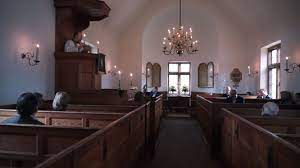Arvo Pärt and the 'holy minimalism' of the Old High tradition
By the mid-1980s, Pärt began to be grouped among other composers labeled colloquially as “Holy Minimalists.” This development attests to the growing awareness of his influence on contemporary music culture. The other composers typically named in this group include the Brit John Tavener (1944–2013), and the Pole Henryk Górecki (1933–2010). Neither of them used the tintinnabuli technique, but their mature styles developed out of examinations of austere aspects of sacred music, and their public personas had associations with a religion; John Tavener had converted to the Eastern Orthodox Church, and Górecki was a devout Catholic. They also cultivated musical languages that relied on slow tempi, incantatory repetition, and disciplined musical processes.
From the music of Pärt let us to turn to Mattins in a context such as Old Saint Stephen's, Robin Hood Bay, Whitby or Old Trinity Church, Dorchester Parish, Maryland. The words of Prayer Book Mattins are said "decently and demurely" (as Trollope noted of the Old High clergy of Barchester in their parish churches). The parson is in surplice, tippet, bands, and hood. The windows are clear glass, the walls whitewashed, Commandment boards around the Holy Table. It is a 'holy minimalism', a certain austerity, in which slowness, repetition, and a liturgical discipline shape piety.
The "emotional austerity" of Pärt's work therefore finds something of a reflection in Old High piety in which such austerity, as with his musical compositions, is indicative of opening to and dependence upon the transcendent:he has been clear about the theology of his music, one of representation of the serenity of God’s countenance, as espoused in Eastern Christianity.
Phrases from Prayer Book Mattins and Evensong might come to mind, expressing what it is for life to be ordered towards "the serenity of God's countenance":
with a pure heart and humble voice ... a godly, righteous, and sober life ... that the rest of our life hereafter may be pure, and holy ... O Lord, in thee have I trusted: let me never be confounded ... who art the author of peace and lover of concord ... that all our doings may be ordered by thy governance ... Give unto thy servants that peace which the world cannot give ... may pass our time in rest and quietness ... granting us in this world knowledge of thy truth, and in the world to come life everlasting.
The article's summary of Pärt's music also has some relevance in drawing comparisons with Old High piety:
It proposes provocatively that a composer may be both rigorous and accessible; the path to a new style may lie in early music rather than in constant innovation ... that music can be a sacrament, a connection to the divine, not always through narratives of human experience, but as a locus for timelessness and serenity.
'Rigorous and accessible' is a phrase we might very easily apply to the Book of Common Prayer. 'Narratives of human experience' could describe those Enthusiasms which exalt transitory experiences, whereas the Old High tradition presents ordered, common prayer as "a locus of timelessness and serenity". In the modesty and reserve of quiet Prayer Book Mattins or Evensong in a plain parish church, we have an echo of what Bouteneff sees in Pärt, "his cultivation of stillness, his inclination towards reduction in pursuit of the essentials".






Comments
Post a Comment